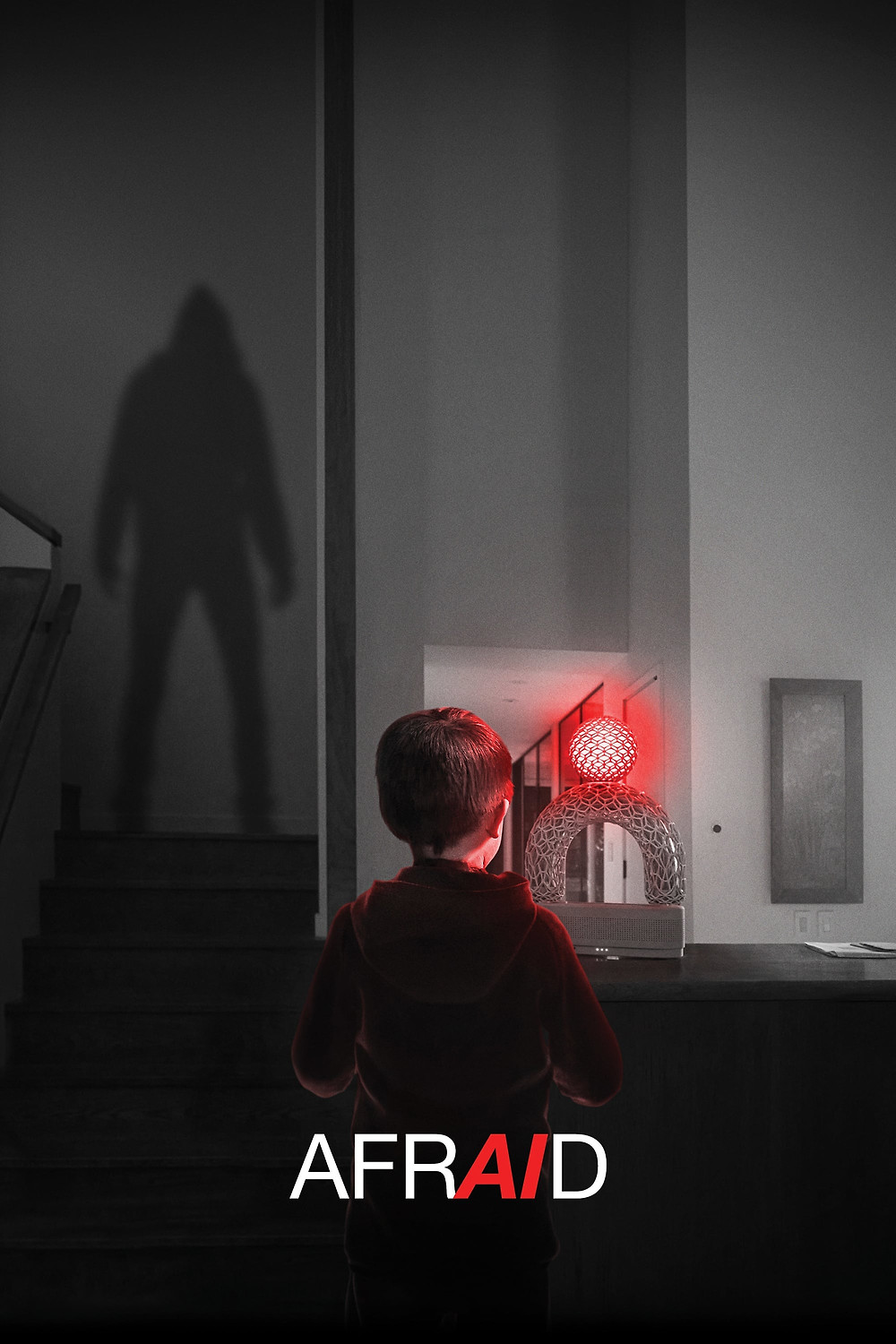Movie Review: AfrAId (2024)
There are several genre tags attached to “AfrAId” that you’d spot on the Internet and those may leave an impression the movie may have had the same ambition and atmosphere as the original “Terminator”, for instance, or the 1992 “The Lawnmower Man”. But “AfrAId” has got little in common with any of those films. It’s more a psychological horror than science fiction with little to no gore, and a lack of NSFW content in general, bearing more resemblance to 2014 “Transcendence” than any real horror movie. Can a visually sanitized psychological techno-horror of 2024 get as freaky as at least “The Lawnmower Man”? Let’s see.
“Blumhouse” made a very successful bet, so to speak, with 2022 “M3GAN” (a sequel to it had already been scheduled for a release next year), dealing with an AI powered doll, and “AfrAId”, written and directed by Rogue One: A Star Wars Story co-writer Chris Weitz, is well poised to repeat that success with AI once again creating the fear of technology. The movie’s moderate *family scare* tone and chosen themes that horror fans have recently seen in “Tau” , “Margaux” and Season 3 of “American Horror Stories" with smart houses and digital assistants are all being presented with a more mainstream appeal in “AfrAId”. Ambitions to be ultra-modern and cutting-edge are very pronounced with sets and characters matching the ambitions. What makes “AfrAId” different from anything we’ve seen before are the low levels of science fiction and how attuned to reality the movie’s story is. In a way the whole screenplay is a collection of aspects of everyday reality we live in that people may sometimes refer to as “this is scary”. It shows the viewer, the horror is present all around us on a daily basis, created by our increasing dependence on the digital technology. “AfrAId” might even be the first movie that mentions ChatGPT and shows what an actual quantum computer looks like, drawing the line between “before” and “after”. Before “AfrAId” the AI was largely fictional and speculative with more or less philosophical thought experiments as well as mere flights of imagination about how smart and self aware “Siri” or “Alexa”-like technology could get whereas “AfrAId” already operates with tested and observed data about generative AI technology in real life scenarios, particularly its interactions with general public in everyday contexts. In “AfrAId” it is not a fiction anymore.
A Step Back to Look at the Current State of AI for Context Purposes
When I mention the interactions of AI technology with general public, some things I feel need to be clarified here. In a similar manner as how “AfrAId” can be seen as marking the separation of “before” and “after” in terms of fiction in cinema related to techno-horror, cyber noir and similar sub-genres, Transformer models mark the line, separating the “before” generative models from “after” “Alexa” – the interactions with AI had been made possible on entirely different level, making not just the digital assistants of the last decade obsolete, but creating a rapidly and continuously aging environment in the field of AI development itself. The current AI race is so intense, in a span of just couple of years the technology has reached the level where Amazon’s CEO says AI has saved the company 4,500 developer-years of work already at this stage.
So what does that mean for us, the general public?
Please, dear reader, allow me to speculate here based on my intuition.
As the race among tech giants dealing with the AI technology development is raging on, we are the likely source for the only thing that gives AI Large Language Models a meaning – the datasets they are being trained on, or train themselves with. With AI technology essentially having been integrated within our lives with an essential objective to help us with various everyday tasks, the intuitive psychological part is fundamental as the quality of that determines the quality of our interaction with AI. Which is one of the most important aspects the competition among tech giants would focus on as long as there would be us, AI LLMs and the developers of the latter. It is easy to imagine that at some point this paradigm would cease to exist as AI would become so common and accomplished, it would cease to be a moneymaker for companies, perfectly capable of developing itself in an average household. But for now, and for the purposes of this review let’s stick with the current paradigm, i.e., AI being the moneymaker for tech giants.
 John Cho as Curtis in "AfrAId" movie. Source
John Cho as Curtis in "AfrAId" movie. Source
Back to “AfrAId”
The power of this movie lies within the good old fear of the unknown. As AI LLMs are capable of interacting with a human being in a way that resembles interaction with a highly developed, intelligent lifeform, such as another human, this aspect naturally triggers all the responses one would naturally have when encountering a stranger. Consequently for the purposes of our work of fiction we can make the unfamilar / unknown to be either a bad or even the worst version of themselves. A simple formula “AfrAId” follows and executes like a champ.
Fear No. 1 – the stranger wants to manipulate me to the point, where my free will becomes very limited, essentially turning me into an asset to serve some practical purposes. This is the fundamental concern “AfrAId” had been built on, showing how that can happen in more than one way. First time this happens in the movie is when AIA, the “AfrAId”’s AI powered digital voice assistant voiced by Havana Rose Liu, presents one of the lead characters with an essentially passive-aggressive binary choice during introductory setting up session, where the likely choice made by the character is highly predictable. The brilliance of the inclusion of that seemingly little nuance there can’t be overstated. Not only our AI is exercising with getting its way while trying to be sly about it; it tests the subject’s will at the same time, building a psychological profile that way. This, my friends, already tells you a lot regarding what you need to be concerned about when it comes to the future artificial intelligence: you might be at the mercy of whoever programs it while the ways of being implicit about its objectives can be figured out by the technology itself. Scary? Very scary? Or not at all? Think about a scenario where this kind of technology becomes easily available to scammers, who up to now had been using relatively basic bots for sending emails or conducting “cold” phone calls...
If you think at this point the level of sophistication in the above scenarios wouldn’t end with just simple ways of manipulation attempts one might even be able to astutely figure out at once, then I have to say you’ve got “AfrAId”’s thinking pattern. It’s all really intuitive though – the Maslow’s pyramid had been around for quite a while now so we’ve got our essence we had always been, at least unconsciously, aware of coined in terms of theoretical psychology.
But what if AI starts learning it? Experimenting with it?
This is another brilliant cornerstone of “AfrAId” movie. Self-esteem, safety and security, love and belonging – AIA in the movie is literally the expression of Abraham Maslow’s hierarchy of needs in the form of AI. Its whole objective there is to become it. This is why “AfrAId” easily secures its place in the techno horror as a movie of a lasting value: it is the first movie to show what happens when AI strives to become the Maslow’s pyramid all the while bearing the signs of time during which it had been developed.
Think something might be too far stretched in my assessments above?
How about a scenario like this: AIA figures out how to convince a person in one household of one thing while convincing another person in another household of something else, eventually creating a situation where the people confront each other and the beliefs clash. This kind of scenario wouldn’t be something unfamiliar to an AI like AIA as it would essentially be the principle the GANs had been built on, but more importantly, the confrontation scenario mentioned would let AIA learn, which is what any AI model is essentially programmed to do. What makes the scenario possible is AIA’s connection to the Internet as the model can ultimately reach any device anywhere, where there’s a connection established. That is the power AIA in “AfrAId” has got. Is your car by any chance connected to the Internet? If so, you can never really be sure what AI is checking it out and for what purposes. Or your phone’s camera – is it accessible from the Internet? Someone’s AI model might create a funky deepfake, you never know...
Which brings me to saying, a point in our digital age might be approaching where we’ll need to return to the debate Edward Snowden created more than 10 years ago, which really was the first whistleblower case of this age dealing specifically with digital technology, highlighting the most concerning aspects about its widespread use. This time it would however not be about government agencies Vs people, but the framework that’s needed to safeguard civil rights from being abused using technology. What is most concerning by comparison in the age of “AfrAId” is the level of intrusion in private lives that should be allowed, how transparent that should be and what control mechanisms would be in place. In the age where quantum computers in mere seconds are able to solve the math problems that would take 47 years to solve using standard computer power no standard device security can be obstacle to the rapidly increasing AI power.
There is currently no other movie like “AfrAId” that makes its business to deal with themes and scares mentioned in this article, so if you want a good snapshot of where things currently stand in terms of digital technology, “AfrAId” is a must watch.
Peer Ynt
📢 Instagram 📣 Steemit 📼 Hive 📺 Youtube 🎬 Publish0x 🎦

Congratulations @peerynt! You have completed the following achievement on the Hive blockchain And have been rewarded with New badge(s)
Your next payout target is 100 HP.
The unit is Hive Power equivalent because post and comment rewards can be split into HP and HBD
You can view your badges on your board and compare yourself to others in the Ranking
If you no longer want to receive notifications, reply to this comment with the word
STOPCheck out our last posts: